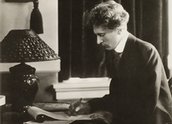
Country Gardens (1919)
Synopsis
Percy Grainger’s own performance of his best-known composition, ‘Country Gardens’, captured on a piano roll.
Curator’s notes
‘Country Gardens’ was Percy Grainger’s biggest hit, both as a concert piece and a piano roll. It is based on an English morris dance tune collected by Cecil Sharp, with whom he shared the royalties for a time. Written as a birthday present for his mother in 1918, he recorded the pianola version of ‘Country Gardens’ for Aeolian the following year.
The Aeolian Company in New York, makers of the pianola, employed many of the leading pianists and piano composers of the day to record piano rolls. Grainger, who had moved to the United States with his mother in 1914, recorded over 60 rolls for Aeolian from 1919 through the 1920s, a mix of his own compositions and arrangements as well as those by other composers.
By the late nineteenth century it was a sign of social respectability to have a piano in the house. The ability to provide at least a basic accompaniment for songs or dancing was quite common, but it was quickly realised that having some kind of mechanical device to actually play the piano could be very useful. The first such devices were invented in the 1860s, but it wasn’t until the 1890s that really effective machines came onto the market. They were a separate unit which actually played the piano by mechanical ‘fingers’ moving the keys and worked through air pressure supplied by foot pedals. The music was controlled by perforations cut into a long roll on paper.
At first the holes on the paper roll were cut by hand following the music notation. This played the music, but without any expression or dynamics. This was fine for singing along to a popular song of the day, but didn’t do justice for the repertoire of classical composers such as Beethoven or Schumann. By early last century several companies in Europe and the US had developed systems which added nuances to the played-back performance. The ‘push-up’ units of the first player pianos were being replaced by pianos with the mechanism inside the instrument itself, discretely hidden behind a panel above the keyboard.
The recording process involved both the pianist playing the music, which was directly punched into the paper roll, and an ‘editor’ who used two levers to add extra perforations to control the dynamics of the playback. An electrically powered machine punched the holes for both the music and the expression markers. After any corrections to this master roll, further copies were made for large-scale reproduction.
Grainger was born in Melbourne in 1882 and moved to Europe with his mother in 1895 to study music, then to the United States in 1914, again with his mother. He has been described as an ‘energetic eccentric’, who was well known for his peculiar personal life. Grainger grew to dislike ‘Country Gardens’ intensely — he loathed the work for its coarseness and huge public appeal — but the royalties were a big part of his income for the rest of his life. He was portrayed by Richard Roxburgh in the film biography Passion (1999).
- Overview
- Curator’s notes
- Audio full title
- Principal credits
- Find a copy
- Make a comment
- Map
- Extras
- Add your review



